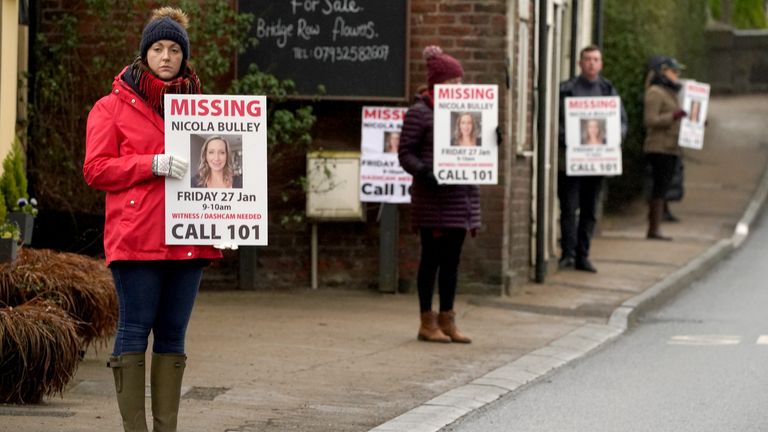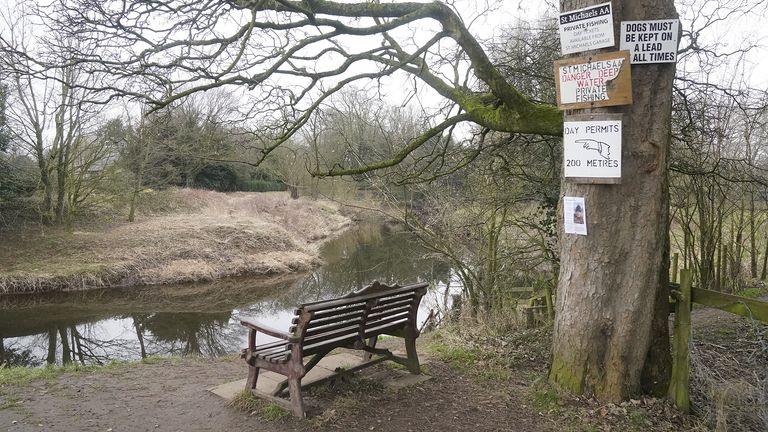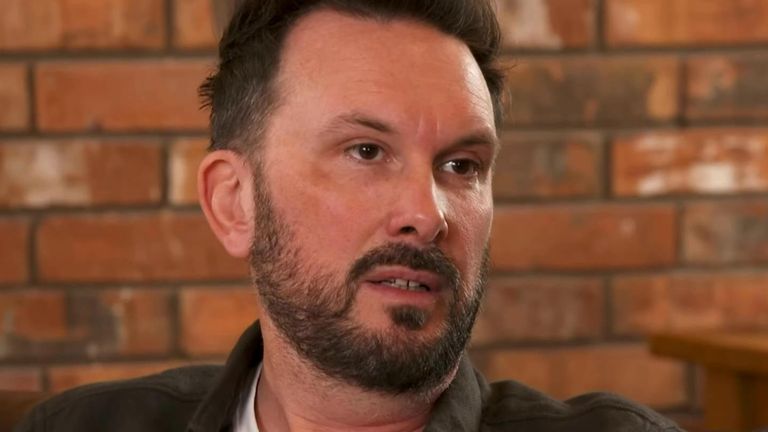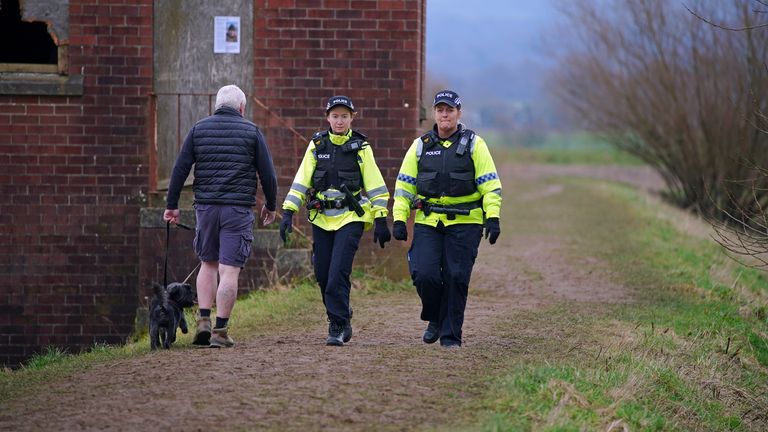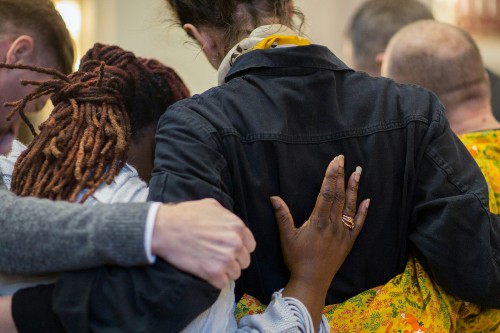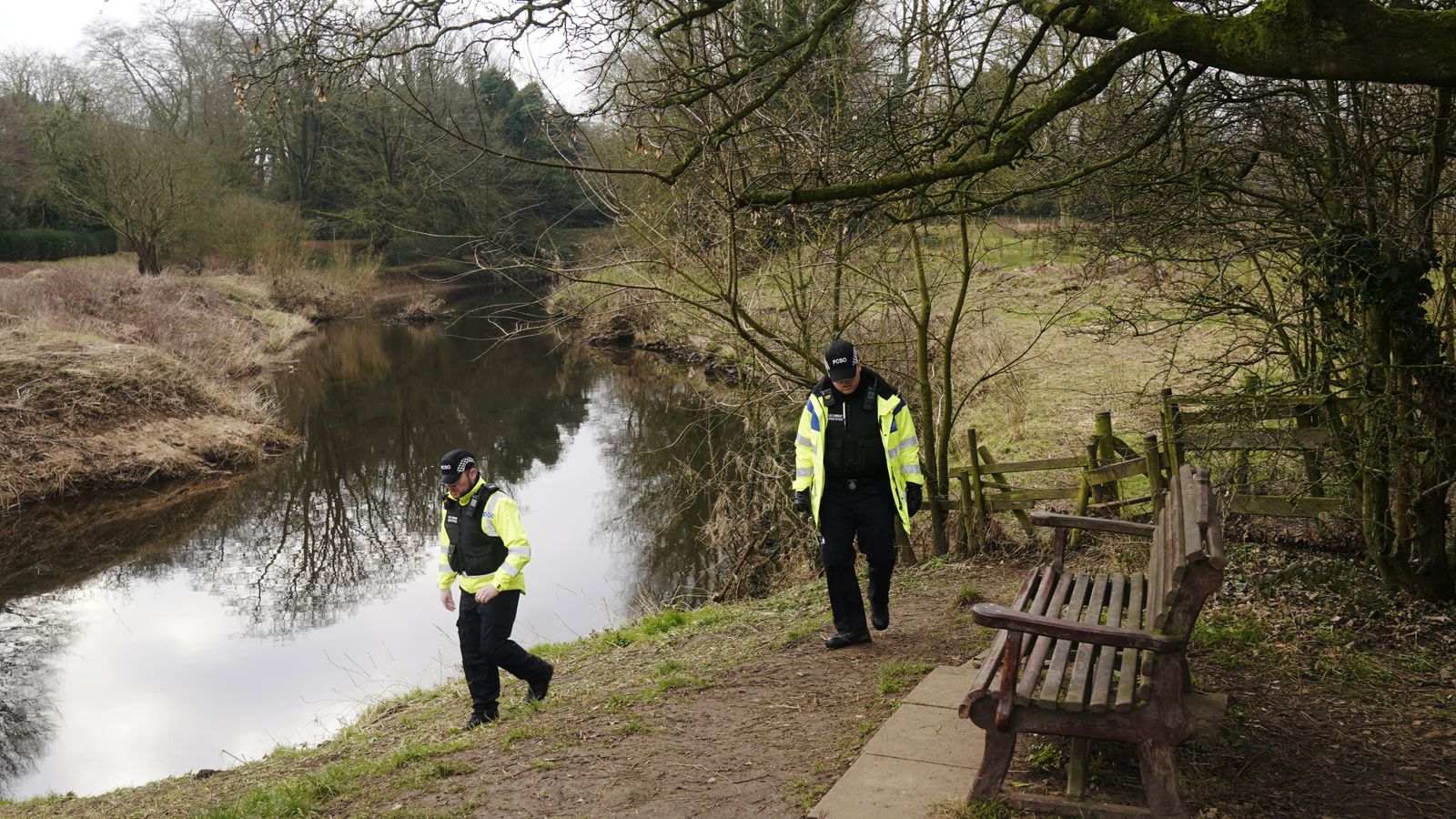
How ‘intricacies’ of local knowledge could help find Nicola Bulley, as police struggle with ‘toxic’ public interest | UK News
Armchair detectives often help solve missing person cases but public interest must also be managed so evidence is not damaged, a veteran detective has warned.
Martyn Underhill, who worked on the Sarah Payne case in 2000, made his comments to the Sky News Daily podcast as members of the public have been travelling to the Lancashire village where Nicola Bulley went missing on 27 January.
Mr Underhill worked on 50 murder cases and now lectures on investigation techniques. He says detectives “cannot beat local knowledge” whether they are hunting a murder suspect or looking for a missing person.
But police had to issue a dispersal order around St Michael’s on Wyre after crowds of strangers turned up to join the Nicola Bulley search themselves, with some even searching derelict properties and potentially putting themselves at risk.
Relatives and friends of Ms Bulley have described some of the interest in the case – particularly some social media clips of press conferences – as “toxic”, as they misrepresented her disappearance and the search to attract engagement, Sky News understands.
But the sheer numbers of even well-meaning members of the public has created problems for the investigation, too.
‘Silly things’ can be ‘absolutely crucial’
Mr Underhill said it is very common for the public to get involved when high-profile missing person or murder investigations are launched.
He said officers “need” the public to be engaged to solve crimes but police could find disruptive levels of interest “frustrating”.
“We had over 1,000 people a day turning up, trying to help find Sarah and over 500 psychics contacting us saying they want to help,” he told the Sky News Daily podcast, speaking of his own experience searching for Sarah Payne.
Read more:
Partner ‘convinced’ Nicola not in river
Specialist team pulls out of search
Images of mum on day she vanished
Retracing dog walker’s journey
Messages of hope tied to bridge
But he said since 2000 the problem has got worse, due to social media and technology, and there is a danger that members of the public end up destroying the scene and crucial evidence.
“Nine out of 10 missing people are solved by the public, not by the police,” Mr Underhill said.
“But equally, you have to manage that expectation. And I call it the tail wagging the dog.
“You have to have clear strategies in place that the public feel like they’re being involved – [so] the armchair detectives don’t feel rejected,” he said.
Mr Underhill said: “The one thing I’ve learnt, and I’ve worked on 50 murders and I’m now lecturing on murders in university, is you cannot beat local knowledge.”
“They know little intricacies – a little tree that’s got a root that sticks out that someone will trip up on if they walked over it.
“It is silly things like that can become absolutely crucial in solving a murder or a missing person,” he added.
Public interest can be ‘toxic’ and ‘dangerous’
Sky correspondent Katerina Vittozzi has been covering Ms Bulley’s disappearance and has felt that some people had come to the village “for a bit of a gawp”.
She told the Sky News Daily: “There were people who would go to the bench where the police say, and we know, that Nicola’s phone was found still connected to that conference call, and they would just stand there.
“They would take a couple of pictures and you could hear them with their friends and family and whoever they had gone down with.”
She also heard from members of Nicola’s family, and her friends, that some of the reactions online have been upsetting.
This is the first time the correspondent has worked on a story being streamed on TikTok by members of the public for engagement, she said.
“People with TikTok accounts have seen there is an enormous interest in this story,” she added.
“The moment you put #NicolaBulley onto social media platforms you get engagement, you get eyeballs on that post.
“I saw a press conference I had been at and listened to, then being clipped up by people who weren’t journalists, and being misrepresented.
“And that’s where it becomes very, very dangerous. That’s when you start to have people then responding to those sorts of posts with their own theories and their own comments.
“And things which, I know, from having spoken with the family and spoken with the friends – they’ve called them ‘toxic’ and really, really upsetting.”
Why do people want to become armchair detectives?
Criminal psychologist Amanda Vicary also spoke to the podcast and said there are a number of reasons why people become so-called armchair detectives.
It may be that they have time on their hands or not a lot going on in their lives so they want to get involved, she suggested.
“Maybe they’ve been laid off from their job or they don’t have a family that’s taking up their time. And this is something for them to do.
“And almost from a positive standpoint, they may legitimately be trying to be helpful to solve this crime or to locate this missing person,” Ms Vicary said.
She agrees with Mr Underhill that the internet and social media have made it easier for people to follow cases online from home.
“I think a bigger component of it that often gets overlooked is the the sense of community that can be in these groups, whether it’s on Reddit or Websleuths or other Facebook groups, about crimes.
“You are surrounded by other people who have the same interest as you.
“It’s like hanging out with friends. You’re just communicating all night talking about a common interest.”
Click to subscribe to the Sky News Daily wherever you get your podcasts
Ms Vicary’s research has shown that women are typically more likely to take an interest in crimes and investigations than men.
“It’s likely because we women fear being the victim of a crime. Right?
“Men, on average aren’t scared to walk their dog outside at night. But if you ask the average woman, she probably is.
“And so this heightened fear of crime draws us to seek out these stories, to learn what went wrong, to try to keep it from happening to us.”
